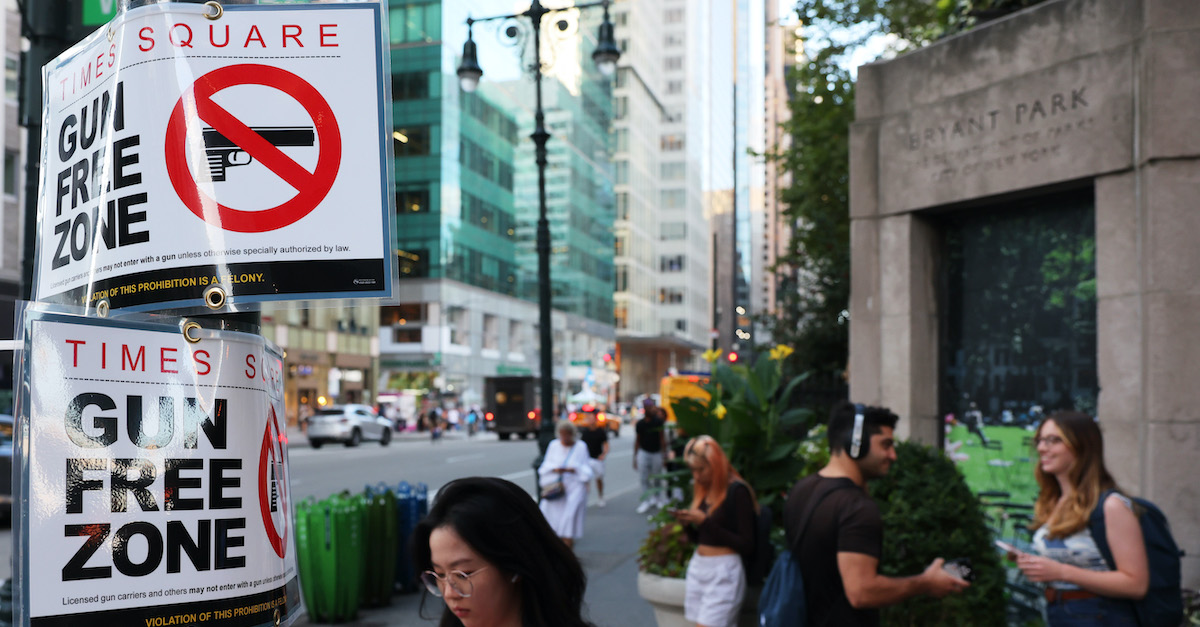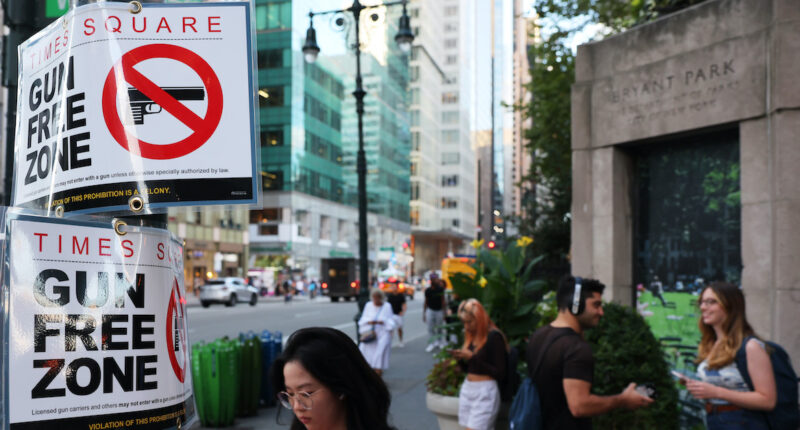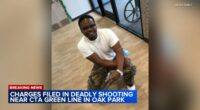
A “Gun Free Zone” sign posted on 41st Street and 6th Avenue on Aug. 31, 2022 in New York City. (Photo by Michael M. Santiago/Getty Images)
The Supreme Court recently made a decision not to consider a challenge to a New York state law that prohibits firearms in “sensitive locations.” This means that a previous ruling by a lower appeals court, which upheld most of the law, will remain in effect.
The law prohibits concealed firearms in various places considered sensitive, including health care facilities, public transit, museums, churches, parks, entertainment venues, and even Times Square in New York City. Additionally, part of the law mandates that individuals demonstrate “good moral character” in order to obtain concealed carry licenses. There is a separate ongoing challenge to this particular requirement.
The law at the center of this issue is called the Concealed Carry Improvement Act (CCIA), which was enacted in July 2022. This law came about after the U.S. Supreme Court invalidated New York State’s previous licensing system in a case known as New York State Rifle & Pistol Association v. Bruen.
In Bruen, Justice Clarence Thomas wrote for the high court’s majority, saying that under the Second Amendment, gun regulations must have a “historical analogue” before surviving constitutional scrutiny. Since the ruling, there has been significant disagreement among courts — and the justices themselves — about the limits or requirements of the “historical analogue” rule.
Schenectady County resident Ivan Antonyuk filed a federal lawsuit challenging the CCIA and achieved an early win before a trial judge who declared it unconstitutional. U.S. District Judge Glenn T. Suddaby, a George W. Bush appointee, ruled that the several provisions of the New York law were not sufficiently “consistent with this Nation’s historical tradition of firearm regulation,” to withstand constitutional scrutiny.
“Simply stated, instead of moving toward becoming a shall-issue jurisdiction, New York State has further entrenched itself as a shall-not-issue jurisdiction,” Suddaby wrote at the time. “And, by doing so, it has further reduced a first-class constitutional right to bear arms in public for self-defense (which, during the 19th and 18th centuries in America, generally came with an assumption that law-abiding responsible citizens were not a danger to themselves or others unless there was specific ground for a contrary finding) into a mere request (which is burdened with a presumption of dangerousness and the need to show ‘good moral character’).”
Both the U.S. Court of Appeals for the Second Circuit and the Supreme Court, however, ruled to leave the CCIA’s rules in place pending appeal.
The 2nd Circuit then reversed a good deal of Suddaby’s ruling in October 2024 and upheld the majority of the CCIA, delivering a big win for New York’s gun safety efforts. The appeals court allowed most of CCIA’s rules to stand, including both the good moral character provision and the sensitive location provision. Other provisions, such as one banning concealed firearms on private property that is generally open to the public, and one requiring concealed carry applicants to provide information about their social media accounts, remain blocked.
New York Attorney General Letitia James hailed the decision as a victory for those who seek “to protect all New Yorkers from the scourge of gun violence,” and vowed to “always stand up to defend these laws.”
Antonyuk and others petitioned the justices to hear the case, and on Monday, the justices declined to do so without comment.
Since the Supreme Court’s ruling in Bruen, challenges to gun regulations and appeals of gun-related decisions have been common due to, as one litigant put it, the “state of disarray” of conflicting appeals court interpretations gun-related statutes post-Bruen.
Love true crime? Sign up for our newsletter, The Law&Crime Docket, to get the latest real-life crime stories delivered right to your inbox.












